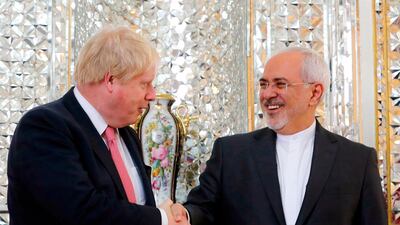British foreign secretary Boris Johnson will travel to Brussels on Thursday to meet the Iranian foreign minister and his European counterparts to discuss the Iran nuclear deal.
He will be joined in his discussions by Iran's Mohammed Zarif, France's Jean-Yves Le Drian, Germany's Sigmar Gabriel, and the EU's high representative for foreign affairs, Federica Mogherini.
The five will discuss the future of the Joint Comprehensive Plan of Action (JCPOA), which was agreed in 2015 when the Iranians agreed to halt their nuclear ambitions in return for a suspension of sanctions by Europe and America.
The agreement has come under intense pressure in recent months as it has appeared that the US president Donald Trump could have been planning on rejecting the premises of the JCPOA and pursuing further sanctions against Iran, especially in light of the recent public unrest in the Middle Eastern country.
The announcement on Wednesday that the Trump administration remained committed to the process, despite belligerent language towards Iran, may have reduced the political temperature surrounding the meeting.
________________________
Also read
Trump 'won't abandon Iran nuclear deal' as Congress drafts compromise
Ahmadinejad reportedly arrested for inciting anti-government protests
________________________
Mr Trump has confirmed that he will refrain from taking a significant measure that could have unravelled the Iran nuclear deal this week, and instead will continue to sign a waiver that would offer sanctions relief to Iran, so keeping the JCPOA in place.
Mr Johnson said: “The UK has always been clear: the Iran nuclear deal is a crucial agreement that makes the world safer. It is vital that we continue to work with our European partners to preserve the Iran deal, and with it the security and prosperity it is bringing to the people of Iran and the world. It is those shared interests which will drive our discussions in Brussels.
“Of course there are areas where we disagree with Iran, not least on its destabilising regional activity and its ballistic missile programme. This will be an important part of our conversation,” Mr Johnson said.
“I will be making it clear to Mr Zarif, on the subject of the recent protests in Iran, that the right to peaceful demonstration within the law is central to any truly thriving society. I will also raise all of our Iranian dual-national consular cases.”
The foreign secretary most recently met Mr Zaif during the diplomatic storm about Nazanin Zaghari-Ratcliffe, a British-Iranian woman who has been held in the Islamic republic since 2016 on charges of espionage.
Mr Johnson has been accused in some quarters of making Mrs Zaghari-Ratcliffe’s plight worse by mistakenly suggesting she was in Iran to teach journalism, when in fact she was there on holiday. After this statement, legal authorities in that country suggested that this was confirmation she had lied about her purpose there, and threatened to double her five-year sentence.

